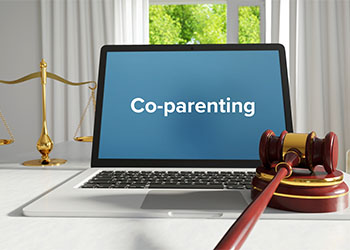Understanding Co-Parenting
Dec. 29, 2023
 Co-parenting is all about teamwork. In Michigan, it's often characterized by joint custody and shared parenting — terms that echo equality and shared responsibility.
Co-parenting is all about teamwork. In Michigan, it's often characterized by joint custody and shared parenting — terms that echo equality and shared responsibility.
But when you get into the legal nitty-gritty of co-parenting, like discussing child support and parental rights, it becomes clear that raising a child is not just about who gets to decide bedtimes or school choices. It's also about financial obligations and legal rights. And yes, it can get tricky, but don't worry — this article is going to break it down for you.
Understanding Shared Parenting
First and foremost, it's important to understand what joint custody and shared parenting entail. In Michigan, these terms refer to situations where both parents retain legal custody of their minor child. This means they share the responsibility for making decisions about the child’s health, education, and welfare. There's a presumption that joint custody is in the child's best interest unless there's a history of abuse or neglect with one of the parents.
To establish joint custody, both parents must sign a parenting agreement that outlines their responsibilities. This agreement must be approved by the court to become binding. If the parents can't agree on a parenting plan, the court will step in and establish one based on the child's best interest. While joint custody may imply equal responsibility for financial support, it's not always the case. In Michigan, child support is determined based on a formula that takes into account the income and assets of both parents.
Physical custody, on the other hand, refers to which parent the child lives with most of the time. Even though Michigan law presumes that both parents should maintain frequent contact with the child, the court typically grants physical custody to the parent who is identified as the primary caretaker. However, parents also have the option to devise their own agreement regarding physical custody.
How Child Support Is Determined in Michigan
In Michigan, parents are legally obligated to financially support their minor children. The parent who doesn't have physical custody is required to pay child support to the other parent. This payment is determined by the Michigan Child Support Formula, which considers both parents’ incomes, parenting time, and any additional expenses. This obligation continues until the child turns 18, or 19 if they're still attending school.
The Michigan Child Support Formula also accounts for co-parenting expenses. These include:
educational costs,
extracurricular activities,
childcare, and
healthcare expenses not covered by insurance.
Typically, these expenses are divided between the parents in proportion to their respective incomes, and the details can be included in the parenting agreement. It's crucial to document these expenses and keep track of payments made, as they may be subject to modification by the court.
Parental Rights and Visitation in Michigan
Regardless of custody status, both co-parents have legal rights regarding their minor child. They have the right to make decisions about the child’s health, education, and welfare, access the child’s school and medical records, and be informed of major changes in the child’s life. They also have the right to participate in the child’s extracurricular activities and special events, unless a court order states otherwise.
Visitation rights refer to the legal right of the parent without physical custody to spend time with the child. Both parents have the right to reasonable visitation, unless it's detrimental to the child. This means that the non-custodial parent can request to have their child for specific periods of time. However, if there's a concern for the child's well-being or safety, the court may restrict or supervise visitation. If the parents can't agree on visitation, the court can order a specific visitation schedule.
Michigan's Mediation Requirements for Co-Parents
Before going to court to resolve a dispute involving their minor child, parents in Michigan are required to attempt mediation. This process involves meeting with a neutral third-party to discuss the issue and try to reach an agreement. The goal of this approach is to encourage parents to work together and avoid relying on the court to decide the issue.
It's recommended that parents develop a written parenting plan to ensure they understand their rights and obligations when co-parenting. This plan should include provisions regarding parental rights, decision-making, parenting time, visitation schedules, communication, and dispute resolution. When both parents sign the parenting plan, it becomes a legally binding agreement under Michigan law.
Get the Support You Deserve
Co-parenting can be tough, but with the right guidance and understanding, it can be a smooth journey. An experienced family law attorney can help you navigate the legalities of co-parenting and ensure that your rights and obligations are protected during any disputes or agreement modifications. Don't hesitate to seek out support when needed, as it can make all the difference in creating a positive co-parenting relationship for you and your child.
The Law Office of Blake P. Lipman is here to help. Based in Farmington Hills, we serve clients throughout the Detroit Metropolitan Area and the Tri-County Area of Oakland, Wayne, and Macomb. Feel free to reach out for any legal assistance you may need.
